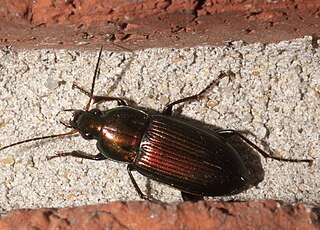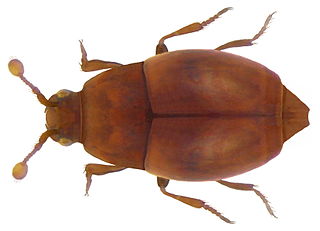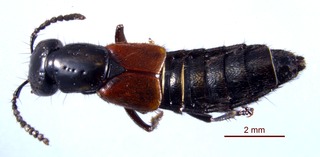
The sharp-tailed sandpiper is a small-medium migratory wader or shorebird, found mostly in Siberia during the summer breeding period and Australia for wintering.

Angel sharks are sharks belonging to the genus Squatina. They are the only living members of the family Squatinidae and order Squatiniformes. They commonly inhabit sandy seabeds close to 150 m (490 ft) in depth.

The Dytiscidae – based on the Greek dytikos (δυτικός), "able to dive" – are the predaceous diving beetles, a family of water beetles. They occur in virtually any freshwater habitat around the world, but a few species live among leaf litter. The adults of most are between 1 and 2.5 cm (0.4–1.0 in) long, though much variation is seen between species. The European Dytiscus latissimus and Brazilian Megadytes ducalis are the largest, reaching up to 4.5 and 4.75 cm respectively. In contrast, the smallest is likely the Australian Limbodessus atypicali of subterranean waters, which only is about 0.9 mm (0.035 in) long. Most are dark brown, blackish, or dark olive in color with golden highlights in some subfamilies. The larvae are commonly known as water tigers due to their voracious appetite. They have short, but sharp mandibles and immediately upon biting, they deliver digestive enzymes into prey to suck their liquefied remains. The family includes more than 4,000 described species in numerous genera.

Fallopia is a genus of about 12 species of flowering plants in the buckwheat family, often included in a wider treatment of the related genus Polygonum in the past, and previously including Reynoutria. The genus is native to temperate and subtropical regions of the Northern Hemisphere, but species have been introduced elsewhere. The genus includes species forming vines and shrubs.

Eurhinodelphis is an extinct genus of Miocene cetacean. Its fossils have been found in Belgium, France, and Maryland.

The sharp-billed treehunter, sometimes called the sharp-billed xenops, is a species of bird in the Furnariinae subfamily of the ovenbird family Furnariidae. It is found in Argentina, Brazil, Paraguay, and Uruguay.

The minute tree-fungus beetles, family Ciidae, are a sizeable group of beetles which inhabit Polyporales bracket fungi or coarse woody debris. Most numerous in warmer regions, they are nonetheless widespread and a considerable number of species occur as far polewards as Scandinavia for example.

Dentalium is a large genus of tooth shells or tusk shells, marine scaphopod molluscs in the family Dentaliidae. The genus contains 50 described species and about 50 extinct species.

Xyletobius is a genus of beetles in the family Ptinidae.

Hydrochus is the only living genus of beetle in the family Hydrochidae, which belongs to the superfamily Hydrophiloidea, and was formerly treated as a subfamily of Hydrophilidae. Hydrochus includes about 180 species, which are found worldwide. The name "Hydrochus" has also been used for a fly genus in the family Dolichopodidae, but this is a junior subjective synonym of the genus Rhaphium.

Sonchus laceratus, synonyms including Dendroseris lacerata and Thamnoseris lacerata, is a species of plants in the daisy family Asteraceae. It is endemic to the Desventuradas Islands in the South Pacific, part of Chile. It is commonly known as the pachycaul tree.

Stator is a genus of seed beetles in the family Chrysomelidae. There are about 14 described species in Stator. Most members of the genus specialize on legumes.

Enochrus, a genus of water scavenger beetles, is the third-largest genus of hydrophilids with 229 species in six subgenera worldwide.

Pterostichini is a tribe of ground beetles in the subfamily Harpalinae. There are about 180 genera and more than 3,800 described species in Pterostichini.

Eumolpini is a tribe of leaf beetles in the subfamily Eumolpinae. It is the largest tribe in the subfamily, with approximately 170 genera found worldwide. Members of the tribe almost always have a longitudinal median groove on the pygidium, which possibly helps to keep the elytra locked at rest. They also generally have a subglabrous body, as well as appendiculate pretarsal claws.

Choragus is a genus of fungus weevils in the family of beetles known as Anthribidae. There are at least 60 described species in Choragus.

Apocellus is a genus of spiny-legged rove beetles in the family Staphylinidae. There are about 11 described species in Apocellus.

Pycnomerus is a genus of ironclad beetles in the family Zopheridae. There are more than 20 described species in Pycnomerus.

Aeletes is a genus of clown beetles in the family Histeridae. There are more than 80 described species in Aeletes.

Belonuchus is a genus of large rove beetles in the family Staphylinidae. There are more than 30 described species in Belonuchus.


















